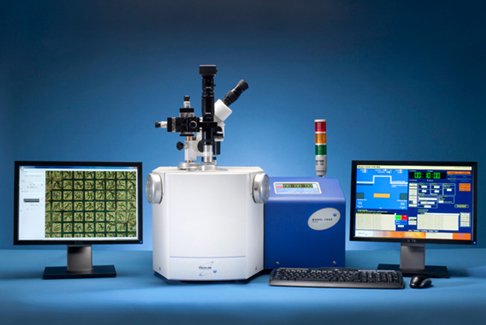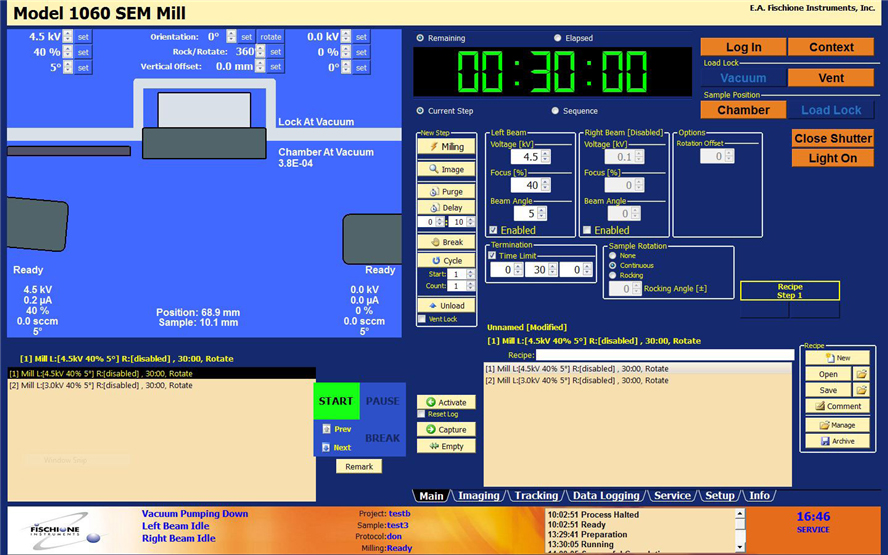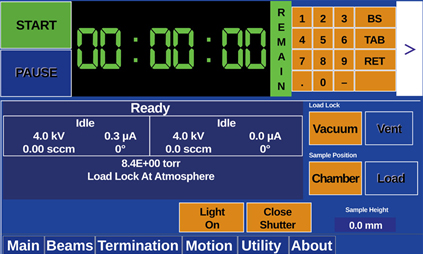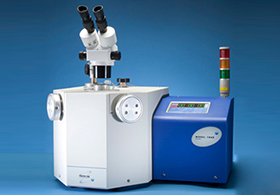SEM Mill
* Two independently adjustable TrueFocus ion sources
* High energy operation for rapid milling; low energy operation for sample polishing
* Adjustable beam diameters
* Simple setup of milling parameters
* Individual, automatic ion source gas control
* Continuously adjustable milling angle range of 0 to +10°
* Sample rocking or rotation
* Stereo microscope for direct sample observation
* High-magniication microscope and CCD camera
* Basic and premium editions available (basic edition shown at left)
ION MILLING
Ion milling is used in the physical sciences to enhance the sample’s surface characteristics. Inert gas, typically argon, is ionized and then accelerated toward the sample surface. By means of momentum transfer, the impinging ions sputter material from the sample at a controlled rate.
Advanced sample preparation
For many of today’s advanced materials, analysis by SEM is an ideal technique for rapidly studying material structure and properties. Fischione Model 1060 SEM Mill is an excellent tool for creating the sample surface characteristics needed for SEM imaging and analysis.
Two ion sources
Two TrueFocus ion sources direct controlled-diameter ion beams to the surface of the sample. Beam diameter is user adjustable. Both sources are concentrated on the sample surface for high milling rates. The ion sources are physically small and require minimal gas but deliver a large range of ion beam energies.
Ion accelerating voltages can be varied from 6.0 keV for rapid milling to 100 eV for inal sample polishing
When operated in the upper energy range, milling is rapid, even at low angles. When operated at low energy, material is gradually sputtered from the sample without inducing artifacts.
The unique design of the TrueFocus ion source allows for a controlled ion beam diameter, which means the ions are directed only to the sample and sputtered material is not redeposited from the sample holder and/or chamber onto the sample surface.
Ion accelerating voltages are programmable and can be continuously varied from as high as 6.0 keV for rapid milling to as low as 100 eV for inal sample polishing. Ion beam currents can be established from hundreds of nanoamperes to tens of microamperes.
The SEM Mill is equipped with Faraday cups for measuring ion beam current.
The ion sources are visually aligned from outside the vacuum using a luminescent target.
Automatic gas control
Two mass-low controllers provide independent and automatic regulation of process gas for the ion sources. he gas control algorithm produces stable ion beams over a wide variety of ion sourcemilling parameters.
Fully integrated dry vacuum system
The fully integrated vacuum system includes a turbomolecular drag pump backed by a multi-stage diaphragm pump. his oil-free system assures a clean environment for sample processing.
Because the gas requirements of the TrueFocus ion source are small, the 70 lps turbomolecular drag pump produces an operating system vacuum of approximately 5x10 mbar. he vacuum level is measured with a Pirani gauge and is continuously indicated.

Premium edition Model 1060 SEM Mill shown fully equipped

Examples of the various sample holders available for the Model 1060 SEM Mill
Sample mounting and positioning
The SEM Mill accommodates a wide range of sample sizes and conigurations for applications such as bulk milling, electron backscatter difraction (EBSD), semiconductor preparation, as well as traditional slope cutting and cross-sectional polishing.
A series of sample holders are available for a multitude of applications. Loading stations further facilitate the sample handling process.
Chamber
The SEM Mill’s vacuum chamber remains under continuous vacuum during operation. A load lock isolates the high chamber vacuum from ambient during sample exchange, ensuring optimal vacuum conditions. he small chamber size makes
it easy to clean during periodic maintenance.
Quick sample transfer
The SEM Mill’s vacuum chamber remains under continuous vacuum during operation. A load lock isolates the high chamber vacuum rom ambient during sample exchange, ensuring optimal vacuum conditions. he small chamber ize makes it easy to clean during periodic maintenance.
Cold trap (optional)
The SEM Mill is available with an optional old trap that is highly efective in removing hydrocarbons and water vapor therefore mproving the chamber vacuum quality. he cold rap features a dewar located within the enclosure.
Precise angle adjustment
With the sample stage ixed in position, the ion ources are tilted to provide the desired milling ngle. Tilt angles are continuously adjustable in the range from 0 to +10°. Ion beam impingement ngles are independently adjustable for each ion
ource.
Ion milling with low angles of incidence (less than 10°), combined with low-energy ion source operation, minimizes irradiation damage and sample heating. Because it facilitates the uniform thinning of dissimilar materials, low-angle milling is highly beneicial when preparing layered or composite materials as well as cross-sectional SEM samples.
Programmable specimen motion
Sample rotation is in-plane and continuous throughout 360°.
The SEM Mill is ideally suited to preparing cross-sectional samples from heterogeneous or layered materials. Sample holders are indexed to the sample stage for repeatable orientation and stage rotation speed (rotations per minute) is user
adjustable. Sample motion control in relation to the ion beam minimizes preferential milling, which can occur when a glue bond line exists in cross sectional samples or when lower atomic number (Z) materials are contained in layered composite samples. In addition, the sample can be rocked in relation to the ion beam so that interfaces or glue lines are never parallel to the direction of the ion beam. Rocking angles ranging from ±40 to ±60° are typically employed.
Automatic termination
The ion milling process can be automatically terminated by elapsed time. A timer allows milling to continue for a predetermined time, and then turns of the power to the ion sources while keeping the sample under vacuum until the
user vents the load lock to extract the sample.
A sample can be serial sectioned by applying subsequent milling steps using the same parameters for the same time duration.
Sample viewing
The viewing window is protected by a shutter which prevents buildup of sputtered material that could interfere with sample observation. A light source located above the sample surface is used for illumination.
Stereo microscope (optional)
The SEM Mill accepts a stereo microscope to enhance sample viewing. he microscope’s long working distance allows the sample to be observed in situ while milling.
High magniication microscope (optional)
The SEM Mill can be conigured with an imaging system including a high-magniication microscope coupled to a CCD camera and video monitor to capture and display images. his system is ideal for preparing site-speciic samples.
When the high-magniication microscope and CCD camera are used, the sample is brought into the load lock for image capture and then returned to the milling position to continue the milling process.
Instrument operation
The SEM Mill features a universal control platform that manages total instrument operation. he basic edition of the SEM Mill
is for users who require only primary level instrumentation function. he premium edition of the SEM Mill adds full computer control for setting, operating, and recording a broad variety of instrument parameters.
Basic edition
The basic edition is programmed via a to screen embedded module.
Initially, milling angles are established by manually positioning the ion sources to their desired orientations. A single-step recipe of parameters including ion beam energy, sample motion, sample position (load lock or milling), and process time is then readily programmed through the touch screen. Once the user initiates the process, the instrument automatically
executes the recipe and continuously displays the real-time milling conditions.

The Operator Console application user interface is available only on the premium edition Model 1060 SEM Mill.
Premium edition
The premium edition is connected to a dedicated computer to provide enhanced programming capabilities and an expanded interface, thus minimizing the need for user intervention during the milling process.
The interface facilitates programming of ion beam energy, milling angle, sample motion, sample position, and process time.
For efective, unattended operation, a series of operational sequences can be established. Typical methodology starts with rapid milling; then a slower milling rate is employed to eliminate artifacts. Milling recipes can readily be stored and recalled.
Advanced functionality includes structured management of sample data, image acquisition and storage, maintenance and log iles, as well as remote access and diagnostics.

The touch screen user interface is available on both basic and premium edition Model 1060 SEM Mills.
The software allows secure access to the various instrument controls corresponding to levels of user expertise and needs for instrument operation.
Administrative rights can be provided to qualiied maintenance staf.
During operation, relevant parameters are displayed in real time on the computer monitor.
When controlled by the computer, the touchscreen displays a Pause button so that, if necessary, instrument operation can be quickly suspended.
The premium edition has the optional capability of remote monitoring via a network connection. This allows the instrument to be both monitored and paused remotely. Multiple SEM Mills can be networked.
Applications
The SEM Mill is an excellent tool for removing surface artifacts from SEM samples leading to improved imaging and analysis.
SEM samples are frequently prepared by metallographic polishing. Often, an unwanted topography remains, even when great care is taken during the preparation process. With today’s advanced SEMs, even a minimal amount of damage may limit the ability to fully resolve or analyze the surface of a sample. Sputtering material from the sample surface with inert gas
ion beam milling is an ideal method to remove prior damage. his is the basis for the SEM Mill.
Bulk
Virtually any type of inorganic SEM sample can beneit from treatment with the SEM Mill. When the ion beams are directed at low incidence angles, layers containing residual mechanical damage, oxidation or contamination are sputtered away, yielding a pristine surface for SEM imaging and analysis.
EBSD
EBSD is a useful technique in which crystallographic information is obtained with a SEM because backscattered electrons form a pattern that represents the material’s crystalline structure, orientation, and texture. Because EBSD is a highly surface-sensitive technique, any type of damage limits the ability to generate a pattern or to determine useful information from the pattern. Therefore, enhancing the surface with the SEM Mill is highly beneicial.
To take EBSD to the next level, the SEM Mill can be used to remove precise and repeatable amounts of material from the sample. his serial sectioning technique yields information that may not be evident when using two-dimensional methods.
Cross sectional semiconductor
In many cases in the semiconductor industry, SEM allows information to be rapidly generated for applications such as failure analysis where it is essential to obtain useful data quickly.
Frequently, the sample is prepared by cleaving or mechanical polishing that causes surface damage. Such damage is readily removed by ion milling with the SEM Mill. Dedicated sample holders facilitate the process.
Minimal maintenance
Material sputtered from the ion source is negligible, minimizing both sample contamination and component maintenance. Automated shuttering prevents the buildup of sputtered material on the viewing window. All system components are easily accessible for routine cleaning and maintenance. When connected to the Internet, the SEM Mill can be accessed remotely for diagnostic purposes.



 瑞塞奇微信公眾號(hào)
瑞塞奇微信公眾號(hào)
